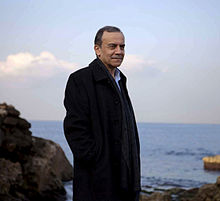Ahmad Kaabour
Ahmad Kaabour أحمد قعبور | |
|---|---|
 Kaabour in January 2014 | |
| Background information | |
| Born | 9 July 1955 Beirut, Lebanon |
| Genres | Arabic |
| Occupation(s) | Singer, songwriter, actor |
| Instrument(s) | Guitar, oud |
| Years active | 1976–present |
Ahmad Kaabour (Arabic: أحمد قعبور, romanized: Aḥmad Qaʿbūr; born 9 July 1955) is a Lebanese singer, songwriter, music composer and actor.[1] He is perhaps best known for his song "Ounadikom" which he composed in 1975 upon the outbreak of the Lebanese civil war.[2]
Background
[edit]Kaabour was born in Beirut, Lebanon, to Mahmoud Kaabour (aka Al-Rasheedi), a prominent violinist, and Fatima Al-Ghoul.[citation needed] He and his siblings grew up in the Basta area of Beirut before moving to Al-Horsh neighbourhood. His father's work cultivated his musical background alongside other influences.[citation needed]
Career
[edit]Singer
[edit]Kaabour is best known for his song "Ounadikom" (أناديكم, "I Call Out to You"),[3] the first track of his album "Ounadikom" (أناديكم, "I Call Out to You") based on a poem written by Tawfiq Ziad.[4][5] He composed the song at the age of 19[1] in 1975 with the outbreak of the Lebanese Civil War, released it in 1976, and his musical endeavors have continued ever since.
Early on in his career, he produced a body of work dedicated to Palestine and its people, which evolved to encompass issues concerning his home country Lebanon and its struggles. His music portrays his belief in the power of music in shedding light on humanitarian causes, and its ability to make a difference. He has released six studio albums to date, and continues to produce music for children's theater, television, film and other media.[1]
Actor
[edit]Kaabour started his career as an actor by taking roles in several plays during the 70s and 80s, as in "Shi Fashil" with Ziad Rahbani in 1983. Later on he appeared "Nagi El Ali" alongside Nour El Sharif in 1991. He made his international film debut playing the featured role of Wadie Haddad in the historical epic Carlos, which premiered at the 2010 Cannes Film Festival.[6][7]
Discography
[edit]- Ounadikom (أناديكم) (1976)
- Hob (حب) (1982)
- Nehna El Nas (نحنا الناس)
- Ouandikom (أناديكم) (1996 Re-release)
- Sawton A'ali (2002)
- Ounadikom (2004 Re-release)
- Baddi Ghanni Lannas (بدّي غنّي للناس) (2010)
- Ramadaniyat Ahmad Kaabour (رمضانيات أحمد قعبور) (2011)
- Ahmad Kaabour yoghanni Omar El Z'inni (2011)
- Lamma Tghibi (لمّا تغيبي) (2019)
References
[edit]- ^ a b c "Charity Dinner to Raise Fund for Needy Al Quds University Students". WAM. Emirates News Agency. 19 April 2009. Archived from the original on 21 July 2011. Retrieved 31 May 2010.
- ^ "Mmedia.me - mmedia Resources and Information".
- ^ "La Palestine dans les textes: Les poètes en musique" (in French). Le Courrier. 21 October 2009. Retrieved 31 May 2010.
- ^ "للعرب - شعر وقصائد توفيق زياد". Archived from the original on 10 March 2009. Retrieved 8 May 2011.
- ^ "Ounadikom (Je vous appelle)" (in French). The International Solidarity Movement. 17 April 2011. Retrieved 8 May 2011.
- ^ Mackenzie, James (24 May 2010). "Cannes festival screens epic French film based on 'Carlos the Jackal'". The Daily Star. Lebanon. Archived from the original on 30 May 2010.
- ^ Leffler, Rebecca (19 April 2010). "Olivier Assayas' 'Carlos' selected for Cannes". The Hollywood Reporter. Archived from the original on 26 April 2010. Retrieved 31 May 2010.
